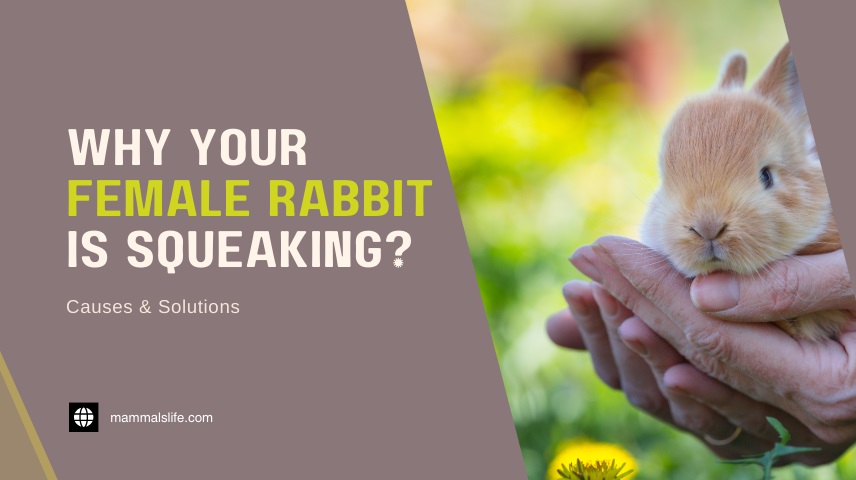Last Updated on February 22, 2025 by Mammals Life
A female rabbit squeaks due to pain, discomfort, or stress. It’s crucial to identify the cause immediately.
Rabbits communicate through sounds and body language. Squeaking can indicate various issues such as injury, illness, or fear. Observing other symptoms like changes in eating habits or behavior helps pinpoint the problem. Ensure the rabbit has a safe, comfortable environment to reduce stress.
Consult a veterinarian if the squeaking persists, as it might require professional attention. Proper care and regular health check-ups are vital for a rabbit’s well-being. Understanding these signs ensures timely intervention, promoting a healthier, happier life for your pet rabbit.
Common Causes Of Squeaking In Female Rabbits
Have you noticed your female rabbit squeaking? This sound can be puzzling and worrisome for many rabbit owners. Understanding the common causes of squeaking in female rabbits can help you ensure your bunny’s well-being. Let’s explore some of the reasons behind this behavior.
1. Communication
Rabbits use sounds to communicate. A female rabbit might squeak to express emotions like excitement or fear. This squeaking is often a way for your bunny to tell you how she feels.
2. Pain or Discomfort
Persistent squeaking can signal pain or discomfort. If your rabbit squeaks frequently, check for signs of injury or illness. A trip to the vet might be necessary to ensure her health.
3. Stress or Anxiety
Rabbits are sensitive animals. Loud noises, new environments, or other pets can cause stress or anxiety. Squeaking might be her way of coping with these stressful situations.
4. Breeding Behavior
Female rabbits might squeak during mating season. This is part of their breeding behavior. If your rabbit is not spayed, this could be a reason for the squeaking.
5. Attention Seeking
Sometimes, a rabbit squeaks to get your attention. If she’s feeling lonely or bored, she might use squeaking as a way to interact with you.
6. Respiratory Issues
Squeaking while breathing can indicate respiratory issues. If your bunny squeaks with each breath, she might have an infection or other respiratory problem. Veterinary assistance is crucial in such cases.
| Cause | Description |
|---|---|
| Communication | Expressing emotions like excitement or fear. |
| Pain or Discomfort | Indicates possible injury or illness. |
| Stress or Anxiety | Caused by loud noises or new environments. |
| Breeding Behavior | Occurs during mating season if not spayed. |
| Attention Seeking | Used to interact when feeling lonely or bored. |
| Respiratory Issues | Indicates infection or respiratory problem. |
Identifying The Source Of The Squeaking
Hearing your female rabbit squeaking can be a cause for concern. Identifying the source of the squeaking is essential for ensuring your bunny’s well-being. This section will guide you through the possible reasons behind the noises and how to address them.
Physical Health Issues
Rabbits can squeak due to physical discomfort. Check for signs of injury or illness. Look at your rabbit’s body for cuts, swelling, or unusual behavior.
- Respiratory Infections: Sneezing, nasal discharge, and labored breathing.
- Digestive Problems: Lack of appetite, bloating, or unusual droppings.
- Pain: Limping, reluctance to move, or visible wounds.
Emotional Distress
Rabbits are sensitive creatures. Emotional distress can cause them to squeak. Look for changes in their environment or routine.
- Separation Anxiety: Missing a companion or owner.
- Fear or Stress: Loud noises, new pets, or unfamiliar surroundings.
- Loneliness: Lack of social interaction or stimulation.
Communication
Sometimes, squeaking is a form of communication. Understanding their language can help. Rabbits use sounds to express various needs and emotions.
| Sound | Meaning |
|---|---|
| Soft Squeaks | Contentment or mild discomfort. |
| Loud Squeals | Pain, fear, or urgent need for attention. |
| Grunts | Aggression or territorial behavior. |
Behavioral Patterns
Observe your rabbit’s behavior closely. Patterns can reveal the cause. Note the times and situations when the squeaking occurs.
- During Feeding: Possible dental issues or food preference.
- When Handled: Discomfort or dislike of being touched.
- At Night: Anxiety or need for attention.
Solutions To Help Your Female Rabbit
Is your female rabbit squeaking? This can be a sign of various issues ranging from discomfort to serious health problems. Understanding these sounds and finding the right solutions can help your bunny feel better and live a happier life. Below are some effective solutions to help your squeaking female rabbit.
Check For Signs Of Illness
If your female rabbit is squeaking, she might be sick. Look for other symptoms like loss of appetite, lethargy, or changes in her droppings. A quick visit to the vet can help rule out serious health problems.
Common Symptoms to Watch For:
- Loss of Appetite
- Lethargy
- Changes in Droppings
- Labored Breathing
Ensure A Comfortable Environment
Rabbits are sensitive to their surroundings. Make sure her cage is clean, spacious, and has a cozy hiding spot. Keep the temperature moderate to avoid overheating or cold stress.
| Environment Aspect | Recommendation |
|---|---|
| Cleanliness | Regularly clean the cage |
| Space | Provide enough room to move |
| Hiding Spot | Include a cozy area |
| Temperature | Keep it moderate |
Monitor Her Diet
A proper diet is crucial. Ensure she has a balanced diet of hay, fresh vegetables, and quality pellets. Avoid giving her sugary treats or processed foods.
Diet Checklist:
- Plenty of Hay
- Fresh Vegetables
- Quality Pellets
- Limited Sugary Treats
Provide Mental And Physical Stimulation
Boredom can cause stress. Offer toys, tunnels, and safe items to chew on. Let her out for supervised playtime to explore and exercise.
Stimulation Ideas:
- Toys
- Tunnels
- Chew Items
- Supervised Playtime
Consult A Vet For Persistent Issues
If squeaking continues, consult a veterinarian. They can offer specialized advice and treatments. Don’t ignore persistent squeaking, as it could indicate a serious condition.
Vet Consultation Steps:
- Monitor Symptoms
- Take Notes
- Schedule a Vet Visit
- Follow Vet’s Advice
Frequently Asked Questions
Why Is My Female Rabbit Squeaking?
Female rabbits may squeak due to stress, discomfort, or communication with other rabbits.
Is Squeaking Normal For Female Rabbits?
Squeaking can be normal but could indicate stress or health issues. Observe for other symptoms.
How To Stop My Rabbit From Squeaking?
Ensure your rabbit’s environment is comfortable and stress-free. Consult a vet if squeaking persists.
Can Squeaking Indicate Rabbit Pain?
Yes, squeaking can be a sign of pain. Monitor your rabbit closely and consult a vet if needed.
What Should I Do If My Rabbit Squeaks?
Check for any signs of distress or discomfort. Provide a calm environment and seek veterinary advice.
Conclusion
Understanding why your female rabbit is squeaking is crucial for her well-being. By observing her behavior and consulting a vet, you can ensure she’s healthy and happy. Always pay attention to any unusual sounds or actions. Proper care and attention will keep your rabbit thriving and content.








